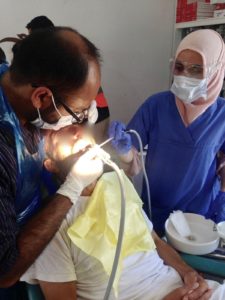Blog
What are the Oral Health Problems Faced by Refugees in Europe?
Written by Khaleda Zaheer
November 2, 2017
Faced with war, persecution and poverty; millions of ordinary people have left their homes, families and livelihoods for a dangerous and perilous journey towards the West in hope of a better future. As the image of the three-year-old Alan Kurdi raised awareness of the refugee crisis around the world, thousands of lives continue to be lost. In 2017 alone, there have been 148,084 arrivals to Europe by sea alone and of those an estimated 2,806 have been reported dead and missing. (1)
Oral health definition
The FDI World Dental Federation defines oral health as being multifaceted including the ability to chew, smile and taste. This universal definition acknowledges that oral health is considered as a fundamental element of physical and mental well-being, which impacts on quality of life. (2)
There is a high burden of oral disease globally contributed in a large part to lack of access to a dentist. However, this inequality in oral health is even greater when the discourse is concerned with refugees who have difficulty in accessing healthcare along with limited financial resources, clean water and nutritious food.
Dental care for refugees
Teams of dentists, dental students and translators volunteer their time and self-fund dental mission trips to help meet the oral health need of refugees. HPF operates from a mobile dental clinic that visits camps in Northern Greece. The location of the camps is decided by the need and the higher the need, the more regular the visits.
Having volunteered with several UK-based charities, including Refugee Crisis Foundation (RCF) and Health-Point Foundation (HPF), on dental relief trips to Athens and Thessaloniki, Greece, and the demolished, “Jungle” in Calais, France; grass-root organisations are struggling to meet the increasing dental need due to limited resources and heavy reliance on volunteers.
Over a course of a week, hundreds of patient are screened, triaged and treated in a mobile clinic. The clinic relies on funding from individuals and donors to maintain the delivery of service and operate a sustainable clinic. The majority of patients treated require emergency dental treatment, which includes temporary fillings and extractions. Whilst trying to meet this increasing need by delivering treatment, a very important aspect of healthcare is neglected: prevention.
Prevention of oral disease
On a dental mission with RCF in February 2017, we designed an oral health promotion program to deliver to children aged between 5 to 17 years old in the Skaramagas refugee camp in Athens by collaborating with a local Greek NGO. The aim was to improve oral health literacy and educate young children on the importance of oral hygiene.
3,500 refugees lived in the camp of which an astonishing 50% were children. Interactive workshops were designed and tailored to account for the different age groups and level of understanding. The content of the workshop included brushing techniques, diet and tobacco cessation advice based on guidelines used in the UK for oral health promotion. The workshop was translated into Arabic, Kurdish and Farsi which were the commonly spoken languages of the refugees in the camp. From our experiences we found the participants to be extremely engaged across all age groups and receptive to the advice that was delivered. (3) This reinforced the importance of having a health awareness programme in the camp which is sustainable and effective.
Discussion
Do we know what the oral health needs of refugees in Europe are? Are the charities working on the ground meeting these needs? How effective are the strategies currently in place?
These are questions left unanswered due to lack of research in this field. There is no data on what the oral health needs are, how oral disease impacts the quality of life of refugees in Europe and access to healthcare. An immediate call to action is required to investigate this by using a standardised instrument to identify the dental need of refugees across Europe. Analysis of this data should be used to advocate on behalf of refugees and identify effective strategies that incorporates prevention and evidence-based interventions to meet the increasing need.
References
1. UNHCR The UN Refugee Agency. Mediterranean Sea Arrivals 2017: UNHCR; 2017 [Available from: http://data2.unhcr.org/en/situations/mediterranean.] (Accessed 31 October 2017)
2. A new definition for oral health developed by the FDI World Dental Federation opens the door to a universal definition of oral health. Br Dent J. 2017;223(3):203.
3. Zaheer K, Sheikh S, Khalid OU, Rizvi Z. Refugees: addressing the burden of oral disease through prevention. Br Dent J. 2017;223(2):121-3.
Khaleda Zaheer is a final year dental student at Barts and The London School of Medicine and Dentistry (Queen Mary University of London) and she is also a Trustee for the charity, Refugee Crisis Foundation. Khaleda has experience of working with refugees and is currently undertaking a research project to assess the oral health needs of refugees in Europe. See her Linkedin here.



